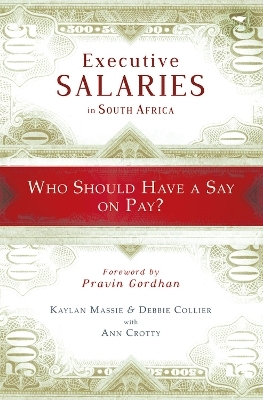
Executive salaries
Who should get a say on pay?
Seiten
2014
Jacana Media (Verlag)
978-1-4314-1012-5 (ISBN)
Jacana Media (Verlag)
978-1-4314-1012-5 (ISBN)
In this exploration, the 2012 executive pay packages of 50 of South Africa's largest and most influential listed companies are examined. This book considers possible mechanisms to rein in excessive executive pay. Without these interventions, South Africa will continue on a path of instability and unrest.
In this exploration, the 2012 executive pay packages of 50 of South Africa's largest and most influential listed companies are examined. A 2006 study revealed that, on average, the CEOs got paid more than R15 million a year—more than 700 times the minimum wage in certain industries. The study's authors predicted that without government intervention, executive packages would continue to sky-rocket. Unfortunately these predictions have come true, despite employment equity measures and changes to corporate governance requirements in King III. The average cash and benefits package of the 50 CEOs studied in 2012 came to almost R13.1 million and once the gains on the vesting and exercise of share options is included, this average rises steeply to almost R49 million. South Africa's widening income inequality and its history of racism, poverty, and social unrest demand that something more be done to reverse this trend. But what will it take for companies to rein in excessive executive salaries? The following questions are considered: How do you strengthen the shareholder's say on pay to ensure that the board of directors responsible for setting pay take into account multiple stakeholder interests? Should the courts, the department of labor, employees, the tax man, or the remaining 99 percent of society have a say on what the one percent are being paid? How do you modify corporate governance standards, the tax code and labor legislation to achieve these goals? How do we turn shareholders into activists and empower the workforce? Is change only possible if a more fundamental shift in attitudes is achieved? This book addresses these pressing issues and considers possible mechanisms to rein in excessive executive pay. Without these interventions, South Africa will continue on a path of instability and unrest, while the rich get richer and the poor become poorer.
In this exploration, the 2012 executive pay packages of 50 of South Africa's largest and most influential listed companies are examined. A 2006 study revealed that, on average, the CEOs got paid more than R15 million a year—more than 700 times the minimum wage in certain industries. The study's authors predicted that without government intervention, executive packages would continue to sky-rocket. Unfortunately these predictions have come true, despite employment equity measures and changes to corporate governance requirements in King III. The average cash and benefits package of the 50 CEOs studied in 2012 came to almost R13.1 million and once the gains on the vesting and exercise of share options is included, this average rises steeply to almost R49 million. South Africa's widening income inequality and its history of racism, poverty, and social unrest demand that something more be done to reverse this trend. But what will it take for companies to rein in excessive executive salaries? The following questions are considered: How do you strengthen the shareholder's say on pay to ensure that the board of directors responsible for setting pay take into account multiple stakeholder interests? Should the courts, the department of labor, employees, the tax man, or the remaining 99 percent of society have a say on what the one percent are being paid? How do you modify corporate governance standards, the tax code and labor legislation to achieve these goals? How do we turn shareholders into activists and empower the workforce? Is change only possible if a more fundamental shift in attitudes is achieved? This book addresses these pressing issues and considers possible mechanisms to rein in excessive executive pay. Without these interventions, South Africa will continue on a path of instability and unrest, while the rich get richer and the poor become poorer.
Kaylan Massie qualified as a barrister and solicitor in 2009 and practices litigation, labor, and employment law, representing clients before courts, the labor relations board, and labor arbitrators. Debbie Collier is currently associate professor in the department of commercial law in the faculty of law at the University of Cape Town (UCT) and is an associate of the Institute of Development and Labor Law. Ann Crotty is an award-winning journalist in South Africa whose work focuses on finance. Pravin Gordhan is the South African minister of finance.
| Erscheint lt. Verlag | 14.3.2014 |
|---|---|
| Verlagsort | Johannesburg |
| Sprache | englisch |
| Maße | 150 x 221 mm |
| Gewicht | 500 g |
| Themenwelt | Recht / Steuern ► Arbeits- / Sozialrecht ► Arbeitsrecht |
| Recht / Steuern ► EU / Internationales Recht | |
| Wirtschaft ► Betriebswirtschaft / Management ► Unternehmensführung / Management | |
| ISBN-10 | 1-4314-1012-8 / 1431410128 |
| ISBN-13 | 978-1-4314-1012-5 / 9781431410125 |
| Zustand | Neuware |
| Haben Sie eine Frage zum Produkt? |
Mehr entdecken
aus dem Bereich
aus dem Bereich
mit den wichtigsten Bestimmungen zum Arbeitsverhältnis, …
Buch | Softcover (2024)
dtv Verlagsgesellschaft
CHF 19,45
Lernbuch, Strukturen, Übersichten
Buch | Softcover (2023)
Franz Vahlen (Verlag)
CHF 31,95


